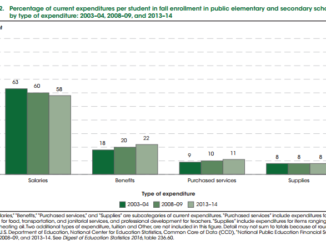
by Jesus Jara and Thom Reilly
It’s no secret that education in the state of Nevada is a hot topic. Everyone – from teachers and administrators to parents and students – agrees that education is foundational to our state’s future success. There is also consensus around the need for significant improvement to our educational system, including improving high school and college graduation rates, and ensuring students are career and workforce ready. To that end, the Nevada System of Higher Education (NSHE) and the Clark County School District (CCSD) have entered into a Memorandum of Understanding (MOU) to work together and establish a Strategic Partnership to promote college and career readiness.
This partnership is a significant leap toward a more collaborative approach to help Nevada students succeed – before they get to college and before they finish high school – with the goal of ensuring they are better prepared for college and/or the workforce. The terms of this MOU specifically address three areas: expanding dual credit programs in high schools to include more workforce-ready programs; beginning workforce and career preparation in middle school; and moving remedial education back to high school.
Dual credit programs that allow students to earn college credit while completing high school graduation requirements have already proven highly effective in encouraging students to graduate high school and attend college. The MOU seeks to expand and improve the delivery of dual credit courses and programs and address the barriers to student participation, such as cost and inconsistent access to dual credit throughout CCSD’s high schools. The agreement also seeks to partner with the workforce community to develop targeted dual credit programs to better meet workforce needs.
One strategy is to offer dual credit academies that allow students to participate in programs directly aligned with business and labor needs such as HVAC, manufacturing, IT/cyber, hospitality and tourism and healthcare. The aim is to equip students with college credits and workforce certificates before they graduate high school. An example of this is the HVAC program at Western High School, where students can earn their HVAC credentials and begin working in this high-demand field upon graduation earning close to $60,000 per year.
Both NSHE and CCSD have a joint interest in and responsibility to prepare students to join Nevada’s workforce, and this effort includes programs such as Nevada’s career and technical education (CTE) programs. The MOU calls for expanding participation in the CTE program at CCSD high schools to allow students to earn articulated credit at NSHE institutions and receive preparation leading to postsecondary and industry credentials in career pathways that include agriculture, business administration, health services, public safety, hospitality and information technology. We also have plans to develop career counseling and piloting assessments for career pathways starting in middle schools, with the help of the University of Nevada Reno’s Cooperative Extension.
More than half (54.6 percent) of CCSD’s high school class of 2016 were placed into remedial coursework at NSHE institutions, and research demonstrates that students placed into remediation are less likely to earn a college degree. The MOU calls for identifying strategies to reduce the number of students needing remedial education in English and mathematics at NSHE institutions by establishing a pilot initiative for select high schools and students based on ACT scores. Participants will be placed into transitional courses during their junior and senior high school years to specifically address the need for remediation prior to high school graduation. NSHE will also assist CCSD in reviewing its high school curriculum in mathematics and English to ensure course content and rigor are appropriate and consistent with college readiness.
Most importantly, NSHE and CCSD are committed to working together to seek private or grant funding as needed to support and enact the programs, pilots and initiatives outlined in the MOU. Preparing today’s high school students for college and future success begins now.
Thom Reilly is the chancellor of the higher-education system in Nevada , and Jesus Jara is the superintendent of the Clark County School District, Nevada.



